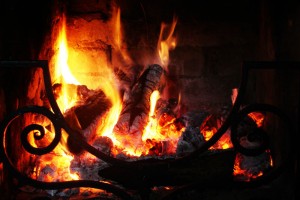Your fireplace is an asset to your home: It adds style, ambiance, and warmth. Your fireplace also can pose a hazard, however. If you don’t have your chimney cleaned and inspected annually, you are putting your home and your family at risk of a chimney fire and/or house fire.

How do chimneys cause fires?
Each year, more than 22,000 American homes suffer chimney fires, and the majority of the time, that fire was caused by a dirty chimney. As you burn a fire in your fireplace, the byproducts of the fire, including gases, ash, fine particles, water vapor, and smoke travel up your chimney. As temperatures cool near the top of your flue, condensation occurs, and the result is creosote, a highly flammable, tar-like substance that clings to the walls of your chimney. If left in place, the creosote can catch fire, causing a fire in your chimney or a fire that spreads throughout your home.
How do sweeping and inspections prevent fires?
Your annual chimney sweeping and inspection by a CSIA (Chimney Safety Institute of America) certified technician is crucial in keeping your home and family safe from a potential fire. Your certified chimney technician will remove the damaging and dangerous creosote deposits from your chimney. Once the chimney is swept, your technician will inspect your chimney to make sure that it is structurally sound and free from any damage. A chimney that is cracked or damaged can allow heat and gases from your fire to access adjacent portions of your home. That can cause a fire hazard and put your family at risk from dangerous gases, such as carbon monoxide, in your home. Your certified chimney technician also will examine your chimney to make sure a fire has not gone undetected. While we expect dramatic flames to shoot from a chimney in a chimney fire, often a chimney fire is a slow, gentler burn that causes damage to the chimney,that you may not be aware of, that can put your home at risk for a more devastating fire in the future.
What else can I do to prevent a chimney fire?
Other than regular chimney sweepings, keeping creosote from building up rapidly in your fireplace can help prevent a chimney fire. Always burn hardwoods that have been thoroughly seasoned, as soft or unseasoned wood causes an excess of smoke leading to faster creosote buildup. Only burn logs that are the right size for your fireplace, and never burn materials that weren’t intended for your fireplace, such as wrapping paper or cardboard. Finally, know the signs of a chimney fire. You may hear a popping or cracking noise from your chimney, notice a lot of gray smoke coming from the top of your chimney, or have a strong smell of smoke in your home. If you notice any of those signs, exit your home and call the fire department. However, if you’ve made sure your fireplace is cleaned and undamaged with an annual chimney inspection, you’ve made the biggest stride toward preventing a fire.
